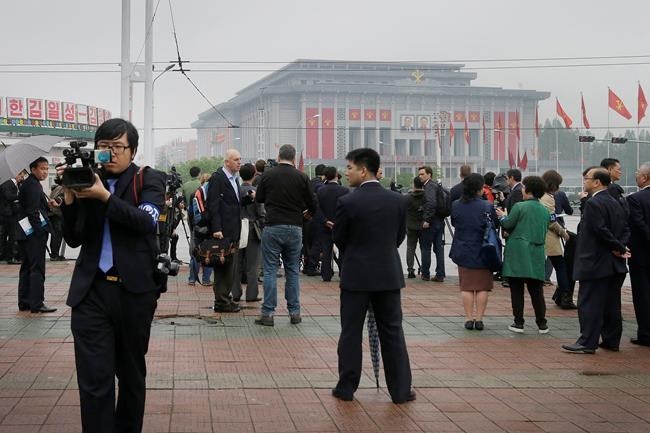
FILE - In this May 6, 2016, file photo, foreign journalists work from across the April 25 House of Culture, the venue for the 7th Congress of the Workers' Party of Korea, in Pyongyang, North Korea. North Korea brought in more than 100 journalists from around the world to make sure the 7th Congress of its ruling party gets global attention, but has only allowed the trusted state-run media inside, and kicked one foreigner out of the country. (AP Photo/Wong Maye-E, File)
May 09, 2016 - 5:53 AM
PYONGYANG, Korea, Democratic People's Republic Of - They came for North Korea's biggest political event in decades. What they have been getting mostly is a lot of sightseeing — except for three who got kicked out.
North Korea has brought in more than 100 journalists from around the world to make sure that the 7th congress of its ruling Workers' Party gets global attention. But four days into the event, which is being held in an ornate hall called the April 25 House of Culture, it has allowed only a small number briefly inside and — other than official state media reports — very little information is being made available on what is actually going on.
While the important decisions and newsworthy declarations were being made by leader Kim Jong Un and the more than 3,400 delegates at the meeting — representing the country's political elite — officials have kept the foreign media busy with trips around the showcase capital to exhibit the places it most wants them to see — a maternity hospital with seemingly state-of-the-art equipment, a wire-making factory where managers say salaries and production are both going up, the humble birthplace of national founder Kim Il Sung, which has been converted into a sort of museum-park with a large "funfair" right next door.
On Monday, it expelled BBC journalist Rupert Wingfield-Hayes and his crew for "insulting the dignity" of the country. O Ryong Il, secretary-general of the North's National Peace Committee, said their news coverage distorted facts and "spoke ill of the system and the leadership of the country." He said Wingfield-Hayes wrote an apology and would never be admitted into the country again.
Wingfield-Hayes was not among the media covering the congress; he and his team had covered an earlier trip of Nobel laureates and had been scheduled to leave Friday. Instead, he was stopped at the airport, detained and questioned. The BBC said Wingfield-Hayes' producer Maria Byrne and cameraman Matthew Goddard were also detained. They were taken back to the airport on Monday and expelled.
For anyone familiar with North Korea, this all comes as no surprise. Information and access are precious commodities here. And keeping them under tight control is one of North Korea's greatest skills.
Instead of covering votes and speeches, reporters have been taken on the subway and given a ride on the newest train, which North Korean officials claim to have developed themselves. They've been shown a farm, and have been taken around an apartment in a new complex of high-rises, government offices and shops on Scientists' Street.
On Monday, the media buses headed off to a silk factory.
It makes for some pretty pictures, some interesting glimpses of daily life — through the bus window. But for a media hungry for real news and insight, it has also produced a lot of grumbling and incredulity.
The selected sites clearly, and by design, shed little light on what life in the capital, or the country, is for the average North Korean.
That is better seen on the side streets, or the coffee shops, or car repair garages. In these places, as long as the topic isn't about politics, the North Koreans show a much different face, the more familiar one of a people whose main cares are about their daily lives, their families, the futures.
Compare that with the typically carefully worded comments one tends to get in even the simplest man-in-the-street interview, this one from a retired physician. Pak Su Won was having a few drinks at a beer hall that is normally reserved for locals, but which allowed The Associated Press in while other foreign journalists wrapped up their Scientists' Street tour.
"Thanks to the care of the party and our leader I am able to come here twice a week to enjoy myself and meet with my friends," the 66-year-old said. "We live happy lives as long as we have our leader and party."
With that said, he then reverted to being a typical grandfather, laughing and joking about his grandchildren.
At one point, the visiting journalists were told on very short notice to dress nicely, then were bused to a conference hall where rows of black limousines used by top party officials were parked. After waiting impatiently to be allowed in, they were told simply and without explanation: "The program has changed. Go back and have lunch."
But on Monday, less than a third of the 100 foreign journalists were allowed to enter the House of Culture for about 10 minutes, during which the congress announced a new title for leader Kim Jong Un — party chairman — underscoring how the meetings are aimed at bolstering the young leader.
The others were forced to rely on the televisions in the hotel media room.
___
Eric Talmadge has been the AP's Pyongyang bureau chief since 2013 and travels to North Korea regularly. Follow him on Instagram at erictalmadge.
News from © The Associated Press, 2016